Download as PDF: OnTheBenefitsOfPhilosophicalCoaching
Miriam van der Valk
kontakt@filoprax.se
I remember the last session with my therapist – instead of reaching for her calendar, she looked at me and said, “Well, I guess you’ll call me if you need me.” Really? I walked home lifted, easy; lighter. I’m OK now. I’m fine. I called a friend, chatted about the good news: My therapist doesn’t think I need more therapy.
She, the therapist, had really helped turn things around for me. I saw her during two periods – first when my daughter was very young and I started getting panic attacks (which turned out to be a ‘delayed trauma response’ to my dad’s long illness and death in my youth,) and then again four years later (when I was going through a divorce.) She was an immigrant, bright, brave, and intimate with loss and ‘otherness,’ like I am too. She was different from the other therapists I’d seen in the various places I’d lived before; she talked about herself, giving examples and drawing parallels. (Quite a change from the clinical setting with the previous one, ‘Dr. S’ – I still don’t know her first name.) But her job was to take me from unhealthy, ‘minus,’ to healthy, ‘zero.’ To help me manage life and get through the day with some kind of equilibrium.
I’ve had the urge to call her since that last session. Say, when I get scared; when it’s difficult for me to trust that things will be OK. With my overexcitable imagination, fear is intense. What is this intense fear telling me about my beliefs – how I think the world works – luck, chance, karma, God? I really benefit from talking about things like that. From thinking about them, out loud, with someone on the same standing, facing the same direction. When I do, I can see the mechanisms and agents at hand. The interplay between my history, my situation, what I want to accomplish, and what I dread – all of that is made conscious. In dialogue, I can become aware of inconsistencies between my reactions and how I interpret them, and I can formulate a way forward for myself.
But I don’t call her. That I get scared sometimes does not imply that I’m unhealthy, off track, or in need of someone to come and take charge of my life. I’m not ill because I wonder what it means to be a human being. Wondering about the meaning of life, my life, does not mean that I’m on ‘minus.’ I’m philosophizing; looking for the wisdom in my situation. That’s profoundly human.
Standing at point ‘zero’ means facing a big problem: what to do now? How do I get to ‘plus?’
We’ll start by defining the terms – therapy, coaching, mentoring. Then we’ll have a look at the ‘philosophical’ in ‘philosophical coaching;’ how does philosophy infuse the coaching process, and what can a philosopher bring to coaching?
-
Definitions
Coaching focuses on work, outcomes, and roads ahead. It creates a setting for discussion, makes sure to follow up, and helps you become accountable and authentic – like a ‘fully functional adult.’ Coaching is about the present and the future. It’s about untapped potential. It focuses on capacity. And – always – the client is the expert and sets the agenda. The client officiates her goals; the coach guides the process of reaching them.
Coaching uses creative future oriented words such as building, constructing, and investing. Coaching connects insight to action.
(When coaching becomes philosophical, we focus as much on the Why as the How. More on that soon.)
Mentoring focuses on growth and maturity – on life, lived fully. Mentoring serves to make visible and strengthen the client’s entire potential. The client is in charge of her goals as well as her process, and the mentor helps develop wisdom and understanding through observation and dialogue.
(Mentor type partnerships are the secret hope and loadstar of every coaching relationship at Filoprax.)
Therapy is about insights into the meanings of the past; healing, and recovery. It is about emotional processing. Therapy focuses on examining past wounds as a means for understanding the present, and for laying good grounds for the future. The therapist helps you see what you need; the therapist is the facilitator of the process.
A therapist can use coaching techniques if a situation calls for it, but a coach is typically not trained to do therapy.
If a coaching client asks me my birthday, I’ll tell them, and even accept a card. If my therapy client asks me the same questions, I’ll ask them why they want to know and what they want to hear.[1]
A therapist is an expert in understanding psychological functions. A coach, on the other hand, need not be an expert in psychology: A coach helps you mobilize your own qualities. She understands that you want and are able to choose and act with authenticity and integrity. Sometimes you need both therapy and coaching in parallel, depending on where you’re at. Sometimes the desire for coaching emerges as the need for therapy phases out.
A therapy setting is a clinical setting and should remain that way; a coach or mentor can meet you in a café, if you like.
Coaching, mentoring and therapy still have much in common: We all want change. We’re about reflection, examination, discovery, learning, progress, and dialogue. We’re all about allowing the client to be active in their own development. The client is in focus, and in charge of their own process. (In coaching and mentoring, the client knows this from the start.) Coaching is not therapy – but it can have ‘therapeutic’ effect.
Philosophy based coaching is not opposed to psychology based therapy – rather, it answers to a different need.[2]
At Filoprax, we love the idea of self-directed, life-long learning. Of Socratic questioning. Eudaimonia. And entelechy; the transformation from potential to actual: Seeing the oak in the acorn. Philosophical practice, to us, is empowerment.
-
On the ‘philosophical’ in philosophical coaching
Philia means “affectionate regard, friendship,” usually “between equals.[3]” Sophia means wisdom. In our coaching and mentoring relationships, philo-sophia is our nationality, our culture, and how we pursue the ancient question and imperative, ‘How should I live?’ and, ‘Know thyself.’
How we do anything is how we do everything, right?
We’ll ask, ‘What sort of life constitutes human flourishing?’ (That is, your human flourishing.) We’ll let our own thinking surface; we allow our own solutions to be found. And we think aloud, together, making the dialogue itself a guarantor against self-deception. We dare to finish our thoughts. There will be active listening, mirroring, and curiosity. Clarification and loosening of knots. Some tying too, maybe.
Karl Popper once said,
Every discovery of a mistake constitutes a real advance in our knowledge … We can learn from our mistakes. This fundamental insight is, indeed, the basis of all epistemology and methodology, for it gives us a hint how to learn more systematically, how to advance more quickly.[4]
We could work with that.
“The true meaning of life,” wrote Viktor Frankl, “is to be discovered in the world[5]” rather than ‘within’ you, or within some closed system. To find it, we must experience, create, and engage with the world – but we won’t all do it in the same way. To establish one’s own best way of interacting with the world requires work on both integrity and authenticity; inner experience and outward expression.
(To us at Filoprax, this type of work is in constant progress. Often delightful, at that.)
We’ll look for the seeds. The map and the track. A lantern if it gets a bit dark, or if we trip over some unformulated psychological history, for instance. We are by our very essence interpretative beings, as Hans-George Gadamer might have put it. He talked about the ‘fusion of horizons’ that can occur when we understand another person. Understanding, he said, is not something we create – it’s something that melts; fuses[6]. The philosophical coach is trained in Socratic dialoguing, meaning searching for essentialities in a reflective, egalitarian way, so that we may see that spring brook of melted snow. We’ll look for the umbrellas too; the overarching principles. We’ll show, tell, suggest and stimulate. We’ll focus, like Gerd Achenbach said, on the life that strives to become thought[7]. And we’ll be especially curious about anything that presents itself as correct, decided, final, given – in short, anything that evades inquiry.
(Those things are always among philosophers’ favorite interests.)
Practicing philosophy in coaching and mentoring is permitting and holistic – we practice rigor and aim for lucidity in all that we do. We wander. We go by trial and error.[8] Emotions, for instance. We’re not doing therapy, but surely our emotions are telling us something. Possibly something very important. “An emotion,” writes Robert Solomon, “is a self-aware engagement in the world.” He continues, “What characterizes … most emotions is their intelligence, their insight, their attunement to the world.[9]” Indeed!
Emotions are not just phenomena to be analyzed and understood; they lie at the very heart of ethics, determining our values, focusing our vision, influencing our very judgment, giving meaning to our lives.[10]
A strong emotion is an indication that a situation requires some looking into. Do you feel grief, rage, anxiety? Might we then ask, ‘Which life goals, right now, do you feel prevented from reaching’ – what are these emotions telling you? Even unpleasant emotions can be viewed as friends on a mission to help you out.
Another convincing case for including emotions in wisdom-seeking activity, from Bertrand Russel this time:
Perhaps one could stretch the comprehensiveness that constitutes wisdom to include not only intellect but also feeling. It is by no means uncommon to find men whose knowledge is wide but whose feelings are narrow. Such men lack what I am calling wisdom.[11]
And what about the other way around – how do your thoughts affect how you feel? In your internal dialogue when facing adversity, for instance; who says what? Are your opinions and values internally consistent (as a philosopher trained in logic might put it?) By the way, how would you discern critical thinking from negative thinking?
A capacity to be critical, to analytically weigh up the claims and arguments we are presented with, remains vital if we are to maintain a degree of independence … Critical thinking is at the very heart of philosophy as the key for emancipation.[12]
Sounds like something well worth looking into. Especially if you’re prone to over-analysis or analysis paralysis.
We’ll examine self, others, work, love. Values. (Do you know your values? Are you sure they’re yours? Should we double-check; do an inventory?) Vision and mission. Motivation. Obstacles. Joy. Creativity. Rest. In philosophical coaching, we’re not limiting ourselves to a particular theory or method. Our toolbox comprises the entire history of philosophy. The ‘philosophical’ in philosophical coaching lets you devote space to questions of meaning: Its focus is on developing the ability to think well – to think with resilience, intellectual curiosity and imagination, all for the purpose of integrated and dignified living. Thinking with life-affirming virtue. Virtues, you know, are acquired by practice and training. (By the way: According to Spinoza, blessedness is a virtue.) Epistemology, further, a discipline traditionally concerned with questions about the nature of knowledge; differences between knowledge and opinion, etc., becomes a practical activity in coaching – it concerns the problem of what to do.
If everybody who mattered to you automatically supported everything you did, what would you do[13]? Can we use these ideas for your philosophical future[14]?
It is the courage to continue that counts, like Churchill said at some point. Our job in philosophical coaching is to find a way to continue, and to do it gracefully.
“Als ich des Suchens müde war, erlernte ich das Finden,” Nietzsche reportedly concluded. (‘Since I grew tired of the chase and search, I learned to find.’ Isn’t it more melodious in German?)
What is it they say – 80% of success is turning up?
-
Notes forward
First of all: you do not need anything to ‘fix’ or ‘cure’ you; there’s nothing ‘wrong’ with you. Philosophical coaching is something you want, because it can be such a deep and powerful tool on your way towards the eudaimonia – flourishing – that you are surely meant for. Coaching can start when you’re ready to secure an upright position, a proud posture; to integrate insights and find authenticity in what you want to do in life. Insights without practice are not effective. Process, activity, and movement are crucial elements of being, as Erich Fromm pointed out – the active, alive person is like a “vessel that grows as it is filled and will never be full.[15]” The active, alive person is boiling, birthing, flowing in and beyond oneself. Running to peace. What a nice image.
“Health,” wrote Frankl, is based on a certain degree of tension “between what one is and what one should become.[16]” Perhaps ‘health’ viewed this way is analogous to entelechy and eudaimonia. Do you see a mountain ahead, a big climb indeed, because you know that you could be so much ‘more?’ Do not despair – that’s a very good place to start coaching.
Philosophy is about asking questions. But philosophy is also about hearing, and answering. “Man should not ask what the meaning of his life is … rather, he must recognize that it is he who is asked,” Frankl continues. And we can only answer by answering for our lives; only respond by being responsible. Everything is talking to you – life, the world – and to philosophize is to respond. Then you can see the oak in your acorn.
What we are doing in philosophical coaching is, in a way, creating pasts for our futures. We create realities: potentialities actualized, meanings fulfilled, values realized.[17]
In the words of the mystic Baal Shem Tov: “It doesn’t matter if I fall – the one I’ll become will catch me.”
[1] (Quote found in Hart, Blattner, Leipsic, “Coaching versus Therapy: A Perspective.” In Consulting Psychology Journal: Practice and Research (2001) Vol. 53, no. 4, p. 232)
[2] Which, exactly? Lydia Amir suggests that it’s a “need in our society created by the weakening of established religion” (as seen in Rethinking Philosophers’ Responsibility (2017) p. 57.) Religious authorities don’t – or at least shouldn’t – make us their patients
[3] Says Wikipedia; https://en.wikipedia.org/wiki/Greek_words_for_love
[4] Popper, Karl (1962) The Open Society and Its Enemies, pp. 375-376
[5] Frankl, Viktor (1946, 2008) “Logotherapy in a Nutshell,” Man’s Search for Meaning, p. 115
[6] As discussed in Herrestad, Henning and Svare, Helge (2006) Filosofi för Livet, p. 85
[7] Ibid., p. 123
[8] Remember Samuel Beckett: “Try again. Fail again. Fail better”
[9] Solomon, Robert (2007) True To Our Feelings: What Our Emotions Are Really Telling Us, p. 19; 45
[10] Solomon, Robert (1995) “The Cross-Cultural Comparison of Emotion,” Emotions in Asian Thought: A Dialogue in Comparative Philosophy, p. 257
[11] Russel, Bertrand (1956) Portraits from Memory, p. 174
[12] Amir, Lydia (2017) “Intellectual Virtues,” Rethinking Philosophers’ Responsibility, p. 240
[13] Try Robert Nozick’s daydreaming ideal utopia thought experiment for five minutes. If there was a machine that could connect to you brain to give you any type of experience – what would it be?
[14] Emerson, reportedly, once said something like, “Our chief want in life is somebody who will make us do what we can.” That would certainly be in line with coaching…
[15] Fromm, Erich (1976) To Have or to Be?, p. 65
[16] Frankl, Viktor. (1946, 2008) “Logotherapy in a Nutshell,” Man’s Search for Meaning, p. 110
[17] This, said Frankl after his years in concentration camps, depends on decisions much more than conditions. Man’s Search for Meaning, p. 135
Philosophy is what we need.
Stöd oss!
Bankgiro 484-4080
FILOPRAX AB

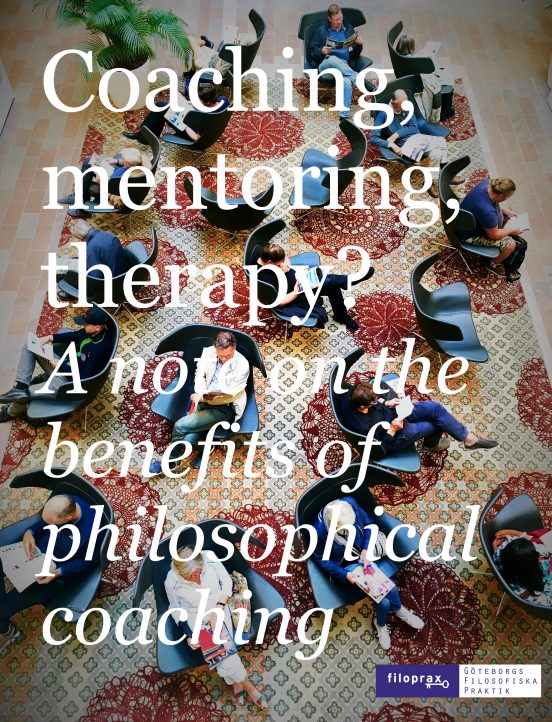
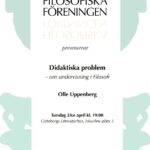

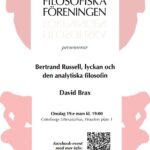


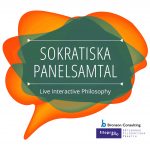
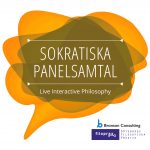

1 pingback